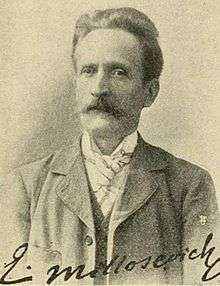Elia Millosevich

| 303 Josephina | February 12, 1891 |
| 306 Unitas | March 1, 1891 |
Elia Filippo Francesco Giuseppe Maria Millosevich (September 5, 1848 in Venice – December 5, 1919 in Rome), was an Italian astronomer.[2][3][4] He specialized in calculating the orbits of comets and asteroids, in particular 433 Eros.
He first studied at the University of Padua; his first papers, on the then-forthcoming 1874 and 1882 transits of Venus, attracted attention and got him the position of professor of nautical astronomy at the Reale Istituto di Marina Mercantile a Venezia (Venice Royal Institute of the Merchant Navy). In 1879 he was offered the position of deputy director of the Osservatorio del Collegio Romano (Observatory of the Collegio Romano), associated with the Ufficio Centrale di Meteorologia (Central Institute of Meteorology) in Rome, and from 1902 (following Pietro Tacchini's resignation) until his death he was its director.
For the calculation of the orbit of Eros, in 1898 and 1904 he was awarded the Prize for Astronomy (Premio per l’Astronomia) of the Italian Accademia dei Lincei; in 1911 he was awarded the Pontécoulant Prize (Prix Gustave de Pontécoulant) of the French Académie des sciences de Paris. He published over 450 smaller and larger works, and a large number of single observations of planets and comets.
In 2004, the main-belt asteroid 69961 Millosevich, discovered by Italian astronomers Piero Sicoli and Francesco Manca, was named in his memory.[5] Naming citation was published on 13 July 2004 (M.P.C. 52326).[6]
References
- ↑ "Minor Planet Discoverers (by number)". Minor Planet Center. 23 May 2016. Retrieved 22 June 2016.
- ↑ Astronomi italiani - M
- ↑ La matematica italiana 1800-1950
- ↑ boka - 0.indd
- ↑ Schmadel, Lutz D. (2006). Dictionary of Minor Planet Names – (69961) Millosevich, Addendum to Fifth Edition: 2003–2005. Springer Berlin Heidelberg. p. 227. ISBN 978-3-540-34361-5. Retrieved 22 June 2016.
- ↑ "MPC/MPO/MPS Archive". Minor Planet Center. Retrieved 22 June 2016.